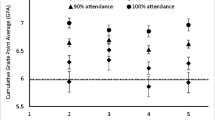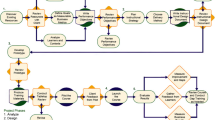Abstract
It is necessary for teachers to consider alternative means of evaluating their students. One method proving to be effective for gathering and organizing student productivity, growth, and development is the portfolio approach. This article describes the Early Childhood Portfolio Assessment Preparation (ECPAP) Model that was used to facilitate the use of student portfolios in two different early childhood education programs. The goals of the model, the six steps followed and the participants' responses to this project are discussed. This article may serve early childhood directors and supervisors who are preparing teachers to implement student portfolios as a supplement or an alternative to the existing assessment and evaluation programs. Also early childhood teacher education students can benefit from the design and implementation of ECPAP.
Similar content being viewed by others
References
Bredekamp, S. (Ed.). (1987).Developmentally appropriate practice in early childhood programs serving children from birth through age eight. Washington, D.C.: National Association for the Education of Young Children.
Flood, J., & Lapp, D. (1989). Reporting reading progress: A comparison portfolio for parents.The Reading Teacher, 1, 508–514.
Gelfer, J. G., & Perkins, P. G. (1992). Constructing student portfolios: A process and product that fosters communication with families.Day Care and Early Education, 20, 9–13.
Gelfer, J. G., & Perkins, P. G. (1991). Teacher-Parent partnerships: Enhancing communications.Childhood Education, 67, 164–167.
Gelfer, J. G., & Perkins, P. G. (1987). Effective communication with parents: A process for parent/teacher conferences.Childhood Education, 64, 19–22
Grace, C., & Shores, E. F. (1991).The portfolio and its use: Developmentally appropriate assessment of young children. Little Rock, AR; Southern Early Childhood Association.
Gronlund, N. E., & Linn, R. L. (1990).Measurement and evaluation in teaching. (6th ed.). New York: Macmillan.
Honig, A. (1979).Parent involvement in early childhood education. Washington, D.C.: National Education for the Education of Young Children
The Joint Committee on Standards for Educational Evaluation (1981).Standards for evaluation of educational programs, projects and materials. New York: McGraw-Hill.
Jongsma, K. S. (1989). Portfolio assessment.The Reading Teacher, 43(3), 264–265.
National Association for the Education of Young Children and National Association of Early Childhood Specialists in State Departments of Education (1991). Guidelines for appropriate curriculum content and assessment in programs serving children ages three through eight.Young Children, 4(3), 21–38.
Northwest Regional Educational Laboratory (1991).Alternative program evaluation ideas for early childhood education programs. Portland, OR: Author.
Salinger, T. (1990).Working toward an assessment model. Princeton, NJ: Educational Testing Service.
Valencia, S. V. (1990). A portfolio approach to classroom reading and assessment: The whys, whats and hows.The Reading Teacher, 43(4), 338–340.
Author information
Authors and Affiliations
Rights and permissions
About this article
Cite this article
Gelfer, J.I., Perkins, P.G. A model for portfolio assessment in early childhood education programs. Early Childhood Educ J 24, 5–10 (1996). https://doi.org/10.1007/BF02430543
Issue Date:
DOI: https://doi.org/10.1007/BF02430543




